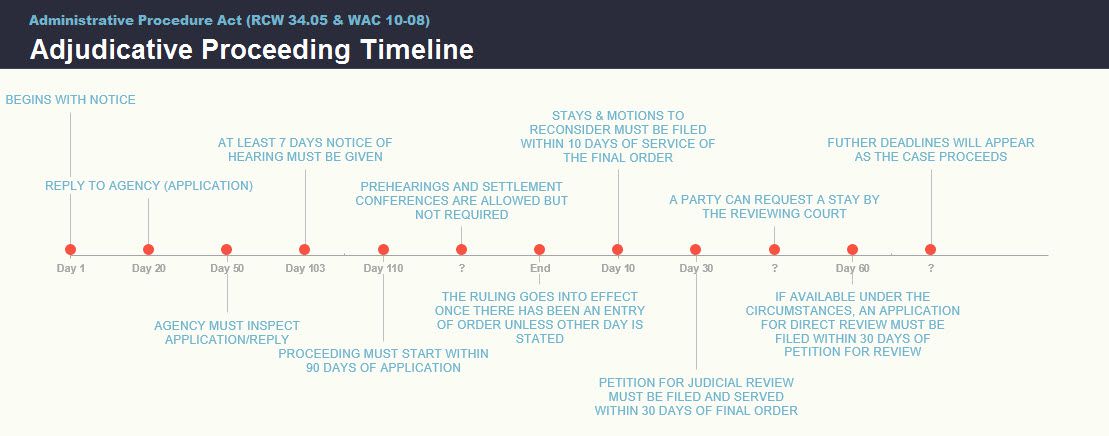Contested Hearings – The Most Important Hearing. An attorney | lawyer’s prospective on Washington State Administrative Agency’s rules surrounding contested hearings.
Arguably, the most important event in the administrative procedure timeline is the actual contested hearing where the facts and case are litigated and a presiding officer will make a “final” decision. The presiding officer, essentially an administrative law judge, must allow all parties and their lawyers an opportunity to present evidence, to make arguments, to respond to evidence and arguments from other parties, to conduct cross-examinations, and to submit rebuttal evidence. Though these hearings have less “formalities” than a traditional “courtroom” hearing which in theory saves time and money for all, as practicing courtroom lawyers | attorneys who handle Washington Administrative matters, we know it’s a fine line between saving time and prejudicing a case. These hearings may be conducted in person (which is almost always our preference) through telephonic or video hearings are an option. Recognizing that some time saving options are good but not at the expense of losing. Each party must make sure they are given the opportunity to participate effectively in, to hear, and if economically feasible, to see the entire proceeding while it is taking place. Again, it is a fine line between judicial economy and effective participation.
Each party will be given the opportunity to submit and respond to pleadings, motions, objections, offers of settlement, briefs, proposed findings of facts and conclusions of law, and proposed initial or final orders. Some of these documents may be filed and ruled on at an earlier proceeding, like a prehearing, others may be filed before the final hearing but are not ruled upon until the actual hearing or afterwards. Having the guidance and counsel of an experienced administrative law attorney | lawyer will help you navigate this tricky portion of the hearing process. Litigation is not easy.

Discovery
As a part of the process leading up to the final hearing, certain methods of collecting relevant evidence, commonly called discovery in legal jargon by lawyers, may be available to obtain information. Each administrative agency will have unique rules governing the scope of the discovery process in an adjudicative preceding and how to force others to appear for the hearing to testify. The presiding officer, the agency, and a party’s attorney of record may issue a subpoena requiring a witness to appear. The presiding officer may also chose to permit the taking of depositions, the requesting of admissions, and other discovery procedures authorized by Washington Superior Court rules 26 through 36 (functionally, this is the discovery process in formal civil cases). Understanding and using these different discovery methods and rules allow lawyers to properly and thoroughly prepare a strong defense or offense in an agency action.
Similar to criminal and civil cases, except their is no jury, the “verdict” is whatever the presiding officer’s ruling | final order is. The ruling goes into effect upon entry of the order unless a later date is stated in the order or a stay is asked for and granted by your lawyer. In certain circumstances, a presiding officer may be able to reach a conclusion at the end of the hearing but in most instances, the ruling will be in writing after the fact. An individual agency may have their own specific deadline of when orders must be provided but there is no broad deadline for the entry of orders. An order must include instructions on the available procedure and time limits for seeking reconsideration or other administrative relief.
An experienced administrative law firm like the Rhodes Legal Group will thoroughly investigate and prepare your case in advance. They will then be able to clearly and efficiently argue your case orally and in writing to the presiding officer to make sure your voice is heard, understood, and respected. Far too many people naively think it will be simple to just talk to the presiding officer to make him or her understand how unfair everything is and will win. Advocacy is an art.
Our firm is defined by its goal oriented mentality, blue collar work ethic, an intense dislike of losing and a refreshingly clear approach to candid legal counseling. Our reputation and client reviews reflect this. Together, our lawyers have over 50 years of combined legal experience and as a team, we have the ability to act quickly and decisively. We practice throughout the state of Washington. Call or email us to schedule an appointment.


